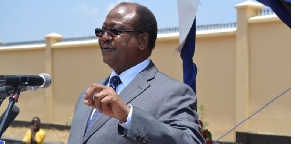Former head of Tanzania anti-corruption agency, Dr Edward Hoseah said the fight against corruption in Africa may be slowed down by ineffective anti-graft agencies.
Dr Hoseah said some of them were apparently weak in executing their tasks.
He told an on-going conference here that high level corruption was still rife in the continent despite concerted efforts to tame the vice.
He said since the African Union adopted a Convention to tame graft some 20 years ago, the menace was still rife in the continent.
"A lot of effort has been made but graft is still there,” said Prof Hoseah, the former director general of Prevention and Combating of Corruption Bureau (PCCB).
He was speaking at the on-going workshop convened to mark 20 years since the AU embarked on a continent-wide war against graft.
This was after the unveiling of AU Convention on the Prevention and Combating of Corruption in 2003 and which has so far been signed and ratified by many member states.
Dr Hoseah hinted that some of the anti-graft agencies could have been weakened by the way they were created.
He cited the African Union Advisory Board Against Corruption (AU-ABC), an Arusha-based facility established to spearhead the effort.
He said the Board has remained advisory and can do little to fight corruption head on by booking the masterminds.
"The board can execute its mandate if it is empowered to fight corruption,” he said, noting that this can be done if it is transformed into a Commission.
The former PCCB boss and an accomplished legal expert challenged the African leaders to intervene and have the Board empowered to fight graft.
Elsewhere, weaknesses in anti-graft bodies in Africa have been seen with their inability to arrest and prosecute the suspects.
The AU-ABC is one of the institutions created to spearhead the anti-corruption fight on the basis of the AU Convention on Preventing and Combating Corruption.
The Convention was signed in Maputo in 2003 and entered into force on August 15th, 2006 after it was ratified by 15 countries.
To date 43 AU member countries have ratified it and are, therefore, parties to the Convention.
The main mandate of the Board is to promote and encourage the adoption of measures and actions of state parties to tame corruption.
However, Dr Hoseah said that was not enough for AU-ABC as it does not have powers to prevent, detect and punish suspects.
The facility cannot even make a follow up on the application of punitive measures and submit reports to the State Parties.
Money laundering and recovery of stolen assets, including cash stashed in foreign banks, came hot on the heels of the meeting.
A delegate from Nigeria identified only as Haruna said African states must adapt to prosecution-led investigations on corrupt deals.
Abdi Mohamed of Kenya's Ethics and Anti-Corruption Commission (EACC) said the country's Constitution was clear on recovery of stolen assets.
"Our jurisprudence allows us to recover such assets without going through the criminal proceedings", he told the meeting at the Arusha International Conference Centre (AICC).
He caused a stir at the meeting when said "(In Kenya) if you cannot account for the assets that you own, you lose to the state".
Mr. Mohamed, was making his presentation during a panel discussion on 'Experiences on Asset Recovery', at the meeting which will end on Thursday.
Tanzania Broadcasting Corporation (TBC) director general Dr Ayoub Rioba said up to 40 percent of Africa's ill-gotten wealth could be stashed in the foreign banks abroad.
According to him, the African countries could be losing up to $150 billion now up from $148 billion in the 1990s.
According to a programme released yesterday President Samia Suluhu Hassan is expected to address the meeting today (Tuesday).
July 11th has been designated as African Anti-Corruption Day in memory of the Convention against the vice signed in Maputo exactly 20 years ago.
The high profile event at the AICC is being held alongside an exhibition at the site which attracted anti-corruption bodies and civil society organizations (CSOs) in Africa.
When he unveiled the celebrations on Sunday, Zanzibar second vice president Hemedi Selemani Abdullah said Tanzania would not relent in its fight against corruption because "it was an evil and a barrier to development".
He added when he addressed a large gathering at AICC's Lake Nyasa Hall that graft has negatively impacted on development in Africa.
George Simbachawene, the minister of State responsible for Good Governance called on the media to support the battle against corruption in the continent.
He said despite increasing concern on graft in the continent, the battle against the vice has not been lost and would be sustained.
"The battle should be sustained forever. We have to bring change to Africa so that we have a corruption-free Africa. Together we will win", he stressed.
The AU Convention on the Prevention and Combating of Corruption was adopted in Maputo, Mozambique on 11 July 2003 to fight rampant political corruption in the continent.
It represents regional consensus on what African states should do in the areas of prevention, criminalization, international cooperation and asset recovery.
Going beyond other similar conventions, the convention calls for the eradication of corruption in the private and public sector.
Africa News of Tuesday, 11 July 2023
Source: thecitizen.co.tz

















